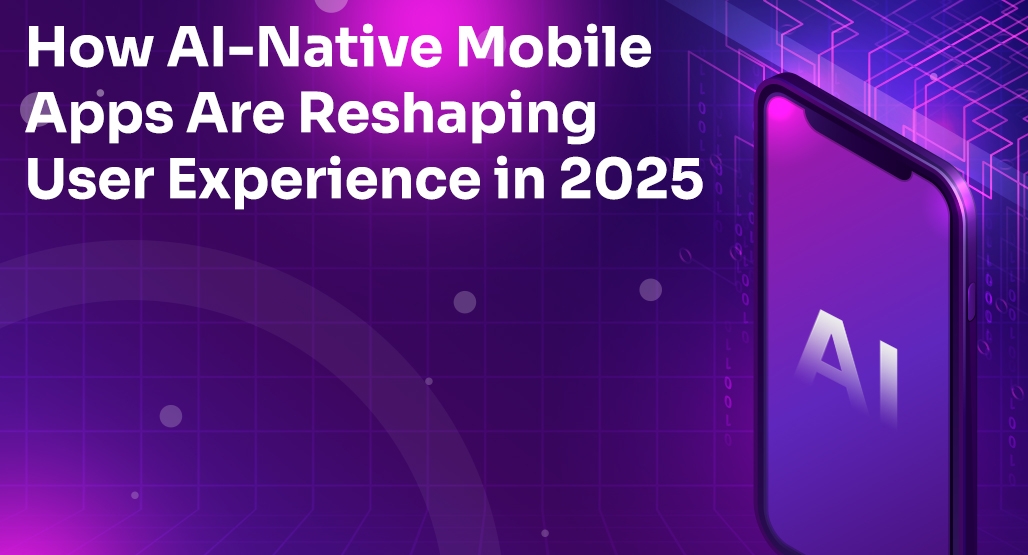How AI-Native Mobile Apps Are Reshaping User Experience in 2025

In 2025, native AI-built mobile apps will improve and sometimes even transform the interactions we have with them. With AI now going beyond just a secondary tool for the creation of mobile applications and moving forth into becoming an inherent part, hence the time when experiences are personalised, performances are faster, and things feel more interactive. The New thing is that it's not about embedding AI in mobile apps, but the one who has started with its integration from scratch.
Key Ways AI-Native Apps Will Transform UX by 2025
1. Hyperpersonalization
The AI-native 2025 app will serve the users, acting to theirs behaviour, preferences and context. e.g. recommendations of food items in a food delivery service may depend on your taste and previous orders, enhancing user delight, engagement.
2. Predictive Assistance
Built on artificial intelligence to understand what it predicts will be the hot demands of users for the next little while. For example, a calendar app could suggest the optimal times to meet based on your schedule and tendencies, making life more convenient.
3. Multimodal Interfaces
AI-native apps enable a variety of input methods, such as voice, text, and gestures, allowing for more versatile interaction possibilities. This multimodal strategy offers accessibility and ease while appealing to a variety of user preferences.
4. Real-time Visual Intelligence
You have your little privacy because the AI-native app should work locally on the device, at least for data processing. This is an example of this trend is Apple's planned Siri changeover is intended towards performing actions (like email content extraction and on-screen text recognition) without compromising the privacy of the user data.
5. Improved privacy and on-device processing
AI-native apps prioritise user privacy by processing data locally on the device. Apple's planned Siri makeover exemplifies this trend, intending to do tasks such as retrieving information from emails and recognising on-screen content while protecting user data privacy.
The Use of React Native in AI-Native App Development
For AI-native mobile apps, React Native is one of the leading frameworks with its cross-platform capabilities and huge ecosystem. Developers could add picture recognition and natural language interpretation through machine learning models like TensorFlow Lite/ONNX.
Furthermore, tools like Workik's AI-powered code generator help to design responsive layouts and optimise speed, hence expediting the development process.
The Future of Mobile User Experience
By 2025, AI-native mobile apps will be the norm, revolutionising how we use our mobile devices. This improvement in personalised recommendations, anticipatory support, simple user interfaces and higher accessibility will evolve the app-user experience to be entertaining, effective and efficient mobile apps.
These apps will be more than just tools; they will be individualised companions who anticipate our needs and actively support our aspirations. The future of mobile user experience lies in the seamless integration of AI, which will result in a more human-centred and individualized digital world.
Conclusion
AI-native mobile applications are setting new benchmarks in user engagement and personalisation. AI implementation in React Native apps allows us to build smart, reactive and user-centric applications according to user behaviour habits. At Swayam Infotech, we specialize in integrating AI technologies within React Native to create next-generation mobile solutions that satisfy customers' evolving needs in this AI-driven era.
- Questions and Answers
- Opinion
- Motivational and Inspiring Story
- Technology
- Live and Let live
- Focus
- Geopolitics
- Military-Arms/Equipment
- Security
- Economy
- Beasts of Nations
- Machine Tools-The “Mother Industry”
- Art
- Causes
- Crafts
- Dance
- Drinks
- Film/Movie
- Fitness
- Food
- Games
- Gardening
- Health
- Home
- Literature
- Music
- Networking
- Other
- Party
- Religion
- Shopping
- Sports
- Theater
- Health and Wellness
- News
- Culture

